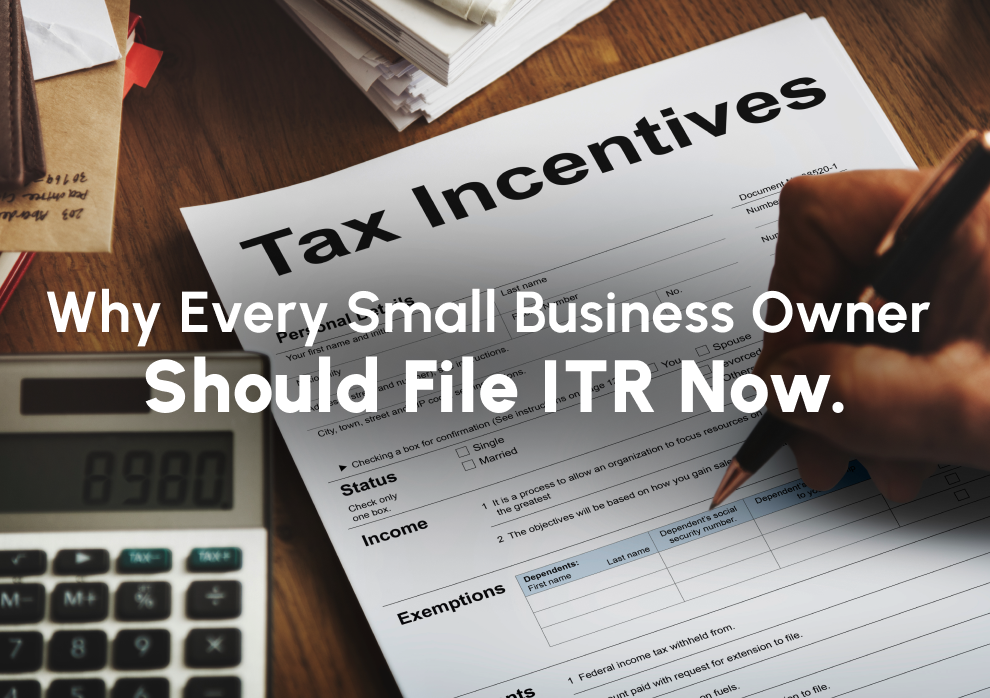If you’re a small business owner, you might wonder whether filing an Income Tax Return (ITR) is really necessary—especially if your earnings seem modest. The truth? Filing your ITR isn’t just a legal requirement in many cases—it’s a smart financial move that can benefit your business in several ways.
Let’s explore why filing your ITR today is a step toward a stronger, more credible business tomorrow.
What Is an ITR?
An Income Tax Return (ITR) is a formal declaration of your earnings, expenditures, tax payments, and deductions submitted to the Income Tax Department. It provides a detailed account of your financial activity for a specific financial year.
There are various ITR forms tailored to different taxpayers—salaried individuals, freelancers, professionals, and yes, small business owners too.
Why Small Business Owners Should File ITR Promptly
Filing an ITR is more than ticking a legal checkbox—it helps you build trust, access financial resources, and future-proof your business. Here’s how:
-
Stay on the Right Side of the Law
If your annual business income exceeds ₹2.5 lakh, filing your return is mandatory. Ignoring this can result in penalties, compliance notices, or even legal proceedings.
Even if you earn less, voluntarily filing your return reflects financial discipline and foresight.
-
Improve Loan Eligibility
Planning to seek a business or home loan, or apply for a credit card? Financial institutions often ask for past ITRs to assess your income and credibility. A regular filing history can help you:
Secure higher loan amounts
Qualify for better interest rates
Speed up loan processing
If you have plans to expand or invest in your business, timely ITR filing can support your funding needs.
-
Simplify Visa Applications
Many embassies—especially in countries like the USA, UK, Canada, or across Europe—require ITRs during visa processing. Your tax return is proof of stable income and responsible financial conduct.
-
Carry Forward Business Losses
If your business faced a tough year, don’t worry. Filing your ITR lets you carry forward the losses to offset future profits, reducing your tax liability. But you only get this benefit if you file before the deadline.
-
Avoid Costly Penalties
Filing late can attract a penalty of up to ₹5,000 under Section 234F. Filing now gives you ample time to review and make corrections—without the stress of deadlines or extra fees.
Which ITR Form Should You Use?
Most small business owners operating under the Presumptive Taxation Scheme can use
ITR-4 (Sugam), which simplifies tax calculation and reduces paperwork. If your turnover exceeds ₹2 crore or your books require audit, use ITR-3.
Form Best For Turnover Limit
ITR-4 Businesses under presumptive income Up to ₹2 crore
ITR-3 Businesses with audited books Above ₹2 crore
Key Benefits of Filing ITR as a Small Business
- Build trust with lenders and clients
- Qualify for deductions and refunds
- Avoid legal issues and penalties
- Keep your finances transparent and compliant
- Gain smoother access to funding or international travel
How to File Your ITR Online
Filing your return online is easier than ever. Here’s how you can do it:
Gather Your Documents
- PAN & Aadhaar
- Bank account details
- Income & expense records
- Previous year’s ITR (if any)
Choose the Correct ITR Form
Based on your business model and income type.
Log in to the e-Filing Portal
Visit: https://www.incometax.gov.in
Fill in Your Financial Details
Include gross receipts, deductions, and taxes already paid.
Verify and Submit
Double-check your form, submit it, and complete e-verification.
Save the Acknowledgment
Download and store the ITR-V for your records.
Common Mistakes to Avoid
- Using the wrong ITR form
- Forgetting to report all income sources
- Missing eligible deductions
- Waiting until the last minute to file
- Avoid these errors by planning and filing early.
Pro Tip: Deductions You Can Claim
Make the most of deductions available to you as a small business owner:
- Section 80C – Investments like LIC, PPF, ELSS
- Section 80D – Health insurance premiums
- Section 10AA – Tax benefits for SEZ units
- Business expenses – Rent, salaries, electricity, marketing, etc.
Keeping accurate records helps you maximize these deductions.
Final Takeaway
Filing your ITR isn’t just a task—it’s a strategic step toward long-term financial success. It reflects responsibility, improves creditworthiness, and sets your business up for growth opportunities.
Whether you run a local store, freelance service, or digital venture, don’t wait until the last minute—file your ITR now and strengthen the financial foundation of your business.
#SmallBusinessIndia #IncomeTaxReturn #ITR2025 #TaxFilingIndia #EntrepreneurLife #MSMEIndia #PresumptiveTaxation #BeFinanciallySmart
Share This Article On:

 fintaxfiling
fintaxfiling